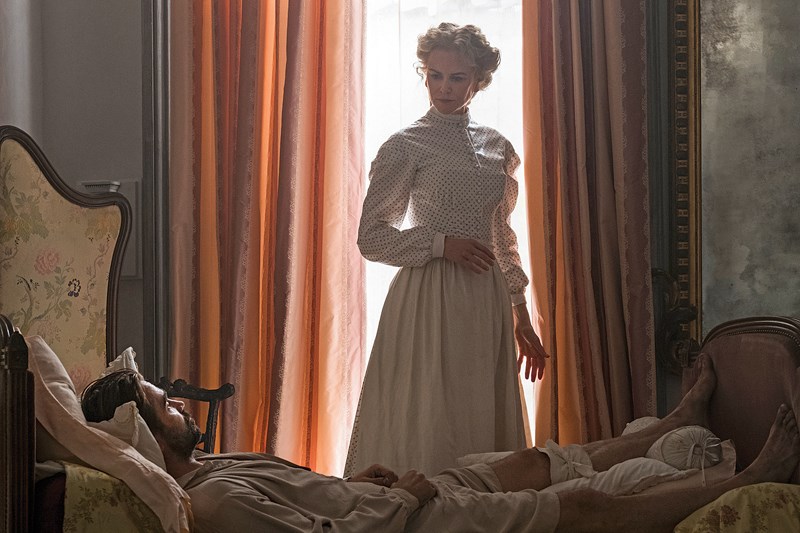The Beguiled. Directed by Sofia Coppola. Starring Nicole Kidman, Kirsten Dunst and Colin Farrell. Rating: 8 (out of 10)
Sofia Coppola’s civil-war era film is a low-key, slow boil thriller, so much so that the lack of histrionics could be mistaken for lack of certainty on the part of the director.
But Coppola, who produced and co-wrote as well as directed, knows exactly what she’s doing.
The film is based on Thomas Cullinan’s 1966 novel and tells the story of a wounded Union soldier taken in by a group of women and girls at a southern boarding school. The soldier, played by Colin Farrell, undergoes a lot, but more fascinating is the psychology of what happens to the women when faced with a surprise injection of testosterone in their household.
The battle is close enough to see the smoke and hear the cannon fire, but Miss Martha Farnsworth (Nicole Kidman) continues to educate her handful of pupils in the arts of music, needlework and good penmanship at her plantation home.
One day young Amy (Oona Lawrence) finds wounded enemy soldier John McBurney on the property with a life-threatening leg wound and the household brings him in long enough to save him and hand him over to the Confederate army. “He’s not going to be here long enough for his name to mean anything to us,” Miss Martha tells the girls.
But after a gruesome bit of surgery, John is on the mend. Each girl in turn makes herself known to him, from sad schoolmarm Miss Edwina (Kirsten Dunst) to hot-blooded teenager Alicia (Elle Fanning). He declares Amy his favourite; even the pious child who calls him “yankee” and “blue-belly” (Angourie Rice) can’t stay away.
And the deserter plays them all.
The solemn routine of the house is replaced by giggling and ill-concealed sexual tension, with the girls clamouring over each other to try to impress him. John helps prune the overgrown shrubbery around the house, and gives the women a reason to dress for dinner.
No passing Confederate soldiers are summoned. “There’s Christian charity to be considered,” after all. But it’s all building to something.
There’s an early, breathless sponge bath from Miss Martha who later lets John flirt with her over a drawing-room brandy. Edwina falls hard, believing every inch of John’s promise to run away with her. But when the soldier finally succumbs to the wrong household temptation all hell breaks loose, culminating in the premonitory line “Edwina, bring me the anatomy book.”
Upon second waking, John is like an animal, and a threat to everyone in the house. The females conspire to be rid of him.
Did Miss Martha save John or punish him? Is she an angel of mercy or Kathy Bates in Misery? A bit of both, likely. There is no demonic smirk nor cackle to give us a definitive answer, which is far more satisfying than any predictable horror-movie path the director could have taken.
There’s no oppressive, cliché heat to underscore the fact that the women need to loosen their bodices; this is an understated piece of work aided by Philippe Le Sourd, who utilizes natural light to enhance the gloom and foreboding that threatens to storm at any second.
And neither is there an overbearing soundtrack, just the rustle of skirts and hum of cicadas in the garden. Coppola once again turns to husband Thomas Mars and his band Phoenix (which lent music to her 2010 film Somewhere) for a moody, minimalist score, including a haunting parting song based on Monteverdi’s “Magnificat,” a great accompaniment for an artful parting shot.



